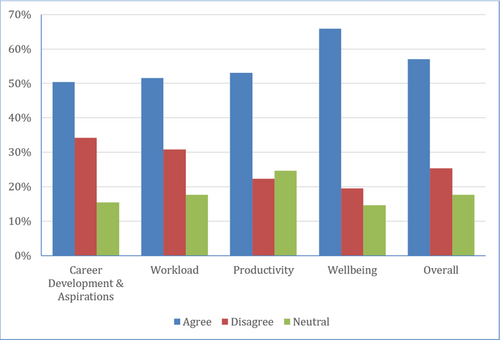July 2025
While the disruption brought about by the COVID-19 pandemic affected everyone, the impact varied between individuals and groups. Early career academics (ECAs) are one of the most vulnerable groups within higher education institutions (HEIs), facing multiple challenges including demanding workloads, pressure to meet increasing expectations, and economic insecurity due to the precarious nature of their contracts.
This blog, based on EDI Caucus funded project: 'Understanding the impact of the Covid 19 pandemic on the career life cycle of early career researchers in academia' presents some of the findings and recommendations of the research project which focused on the lived experiences of ECA’s in UK universities, as well as perspectives from departmental heads and ECA line managers on provision of support.
It is fair to say the UK’s world-leading higher education sector is going through a challenging period, becoming increasingly fragile and susceptible to a turbulent economic landscape. Low student recruitment is having an adverse impact, with many institutions struggling to stay afloat. Most often, when Institutions are facing difficulties, they (justifiably) tend to prioritise and focus on what is considered “important”.
Amid these prioritizations, ECAs tend to be at the lower end of the pecking order, and the resulting uncertainties can have long lasting consequences on their career trajectories. It is therefore imperative that HEIs understand: (i) the nature of challenges ECA face; (ii) the extent to which these challenges are exacerbated during periods of uncertainty; and (ii) how best to support ECAs in order to mitigate long-term negative impacts. It is in this regard that we believe foregrounding ECAs' own stories of their lived experiences during the pandemic could be particularly useful.
Broken boundaries and balancing acts - the lived experiences of ECAs
This research project explored issues regarding the impact of the pandemic on ECAs' workload, productivity, well-being, as well as career development and aspirations. It also examined the effectiveness and appropriateness of the support accorded to ECAs by departments and line managers during and since the pandemic.
As shown in Figure 1 below, at least half of the ECAs surveyed perceived higher workload levels, a decline in teaching and research productivity, as well as negative impacts on career development and aspirations. Amongst the four areas examined, ECA well-being was the most affected, with most ECAs surveyed reporting a decline in their mental health.

Figure 1: Negative Impact of the pandemic on ECAs' career life cycle
These findings were explored in-depth through semi-structured interviews, where ECAs shared mixed lived experiences. An initial relief from being able to work remotely, was quickly overtaken by challenges arising from increased isolation, anxiety from the health crisis, increased workloads, dealing with blurred boundaries, as well as trying to juggle family responsibilities and work in the same space. As one ECA described it: “The workload was relentless, and I ended up exhausted. I didn’t take any time off for about 18 months, and eventually, my health suffered.”
Among the many themes that evolved from the study, the lack of focus and in some instances, the complete lack of acknowledgement of the impact of the pandemic on ECAs’ career development was a constant theme. As one ECA described it, “...during the pandemic there’s no discussion at all. Everything’s paused in relation to career development…. (now) It’s like playing catch-up from the time that we lost.”
Whilst most ECAs acknowledged they had regular contact and received adequate support from their direct line managers, departmental support was either non-existent or simply inadequate. Even those ECAs who received some level of support from their department felt this was reactive rather than proactive.
The pandemic’s unequal toll on ECAs - differences in lived experiences
Our survey analysis of the differential impact of the pandemic on the experiences of different groups of ECAs showed that, in general, the experiences of men were slightly better than women. However, in the area of teaching and research productivity, women had relatively better experience than men. The pandemic seemed to worsen existing inequalities with those with caring responsibilities perceiving greater challenges.
In terms of ethnicity, the ethnic majority (white) ECAs had better experiences than the ethnic minority ECAs, especially in areas of physical well-being and productivity. Perceptions of worsening ECA workload during the pandemic were high among the ethnic majority ECAs. There were also variations of experience between the Russell group and non-Russell group ECA. Even though over 50% of Russell group ECAs felt their overall experience was negatively impacted by the pandemic, Russell group ECAs had a relatively better experience than non-Russell group ECAs.
Looking ahead - where do we go from here?
Some of the key recommendations identified by the study to create a more inclusive and supportive environment for ECAs include:
- The standardization of existing good practices around building ECA’s research and teaching capabilities to improve their ability to meet ever-increasing expectations, while ensuring equitable access to such resources.
- Embedding EDI principles in work practices to ensure greater awareness of existing inequalities.
- Equipping and empowering those providing direct support to ECAs.
- Creating or fostering a ‘safe’ environment where individuals feel empowered to request reasonable adjustments that reflect their circumstances.
- Increasing ECA representation at decision-making groups to improve visibility and voice.
- ECAs’ changing attitudes to work and career aspirations require a systemic change in practice, policy and overall organizational culture.
- Developing a resilient culture capable of dealing with constant crises & rising expectations
This blog is based on the Equality, Diversity and Inclusion (EDI) Caucus Flexible Fund 1 project final report: Understanding the impact of the COVID-19 pandemic on the career life cycle of early career researchers in academia
